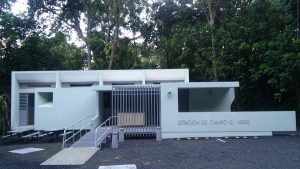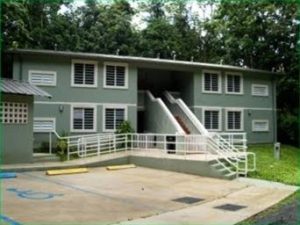Regarding campus facilities and laboratories, the ES Undergraduate Program has access to all available college and campus resources for research and academic activities. Course lectures are held at the College of Natural Sciences in classrooms equipped with projectors and Wi-Fi connections. Researchers’ laboratory space is mainly located in the Facundo Bueso building on campus; some researchers have laboratory space in the College. Most researchers mainly maintain their laboratory facilities through external funding sources.
The Environmental Sciences Program has a total of four teaching labs, including a GIS computer lab, a geophysics lab, a land use lab, and an environmental sciences lab equipped mainly for water quality analysis (turbidimeters, colorimeters, UV/Vis spectrophotometers, incubators, DO meters, pH meters, conductivity meters, and a variety of test kits for nutrient and fecal coliform contamination by Hach, YSI, and others).
The program has recently acquired state-of-the-art equipment such as an ICP-MS (Perkin Elmer) for the measurement of heavy metals, a CHNSO analyzer (Perkin Elmer) for the determination of the carbon, hydrogen, nitrogen, sulfur, or oxygen content in organic and other types of materials, a Discrete Analyzer (Smartchem 2000) for the measurement of nutrients, and a 2-D acoustic doppler flow meter (Sontek Flowtracker) for the measurement of water motion in streams and shallow nearshore areas.
- GIS Computer Lab. Fully equipped Geographic Information Systems (GIS) laboratory to analyze geographic and environmental information with 15 computers, software, and digital projectors.
- Environmental Analysis Techniques Teaching Lab. This laboratory is used for research as well as a training facility for students to learn techniques related to freshwater chemistry, saltwater analysis, soil and sediment studies, environmental microbiology, and air quality monitoring using standard techniques published by the Environmental Protection Agency (EPA).
- Aquaculture Facilities Lab. Undergraduate and graduate researchers have access to an external aquaculture facility developed for large-scale marine biomass production at the college, in addition to each researcher’s individual facilities.
- El Verde Field Station and The Stream House. Additional research facilities are the El Verde Field Station (EVFS) and The Stream House; a complementary facility located in Río Grande, P.R. These facilities belong to the U.S. Forest Service and have been administered by the ES department for the past 10 years. The EVFS is a fundamental facility for the NSF-funded Luquillo Long-Term Ecological Research (LTER) project. It has also been an important resource for research and training of graduate students. These facilities were updated through an assignment from the UPR Central Administration in 2016.
In addition to facilities and equipment, the program has close ties and collaborations with local governmental agencies and groups such as the US Environmental Protection Agency, the US Geological Survey, the Department of Natural and Environmental Resources, CAUCE (Centro de Acción Urbana, Comunitaria, y Empresarial of Rio Piedras), la Sociedad Eco-Ambiental, and our industry partner, Biolípidos de Puerto Rico.

